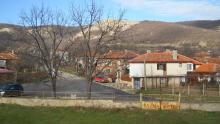Vladimir Zhobov

| from | here adv | interr clt | 2sg pres cop clt |
| excl |
| from | here adv | interr clt | 2sg pres cop clt |
| here adv | 1sg pres cop clt | bear sg f P.part P | and | here adv | 1sg pres cop clt | marry sg f P.part P |
| here adv | and | nom 2sg | interr clt | 2sg pres cop clt | from | here adv |
| from | here adv | 1pl pres cop clt |
| and | disc | disc | and | [...] | this sg f adj | dat m 3sg clt | 3sg pres cop clt | house sg f def | here adv |
| disc | this sg n adj | 3sg pres cop clt | his sg f def adj | house sg f |
| disc |
| disc |
| other sg f def adj | and | this pl adj | many adv | house pl f | one sg n adj | time sg n |
| nom f 3sg | this sg f adj | house sg f | only adv | remain 3sg pres I | one.time pl def adj | house pl f |
| from | this sg f adj | more | miserable pl adj | 3pl impf cop |
| bkch |
| but | seven | eight | child pl n | each sg m adj | person sg m | seven | eight | seven | eight |
| seven | eight | to | nine | to | ten | have 3sg impf I | child pl n |
| now adv | only adv | one sg n adj | only adv | one sg n adj | and | at.all adv |
| from | our sg n def adj | village sg n | ost | here adv | one f sg adj | neighbor sg f | go 3sg aor P | further adv | toward | Sofia sg f place |
| from | where interr | 2pl pres cop clt | people pl | all pl def adj | from | one sg n adj | village sg n | interr clt | 2pl pres cop clt |
| disc | no | nom 1pl | 1pl pres cop clt | from | Sofia sg f place | but | today adv | today adv | morning sg f def |
| 1pl impf cop | in | Kozichino sg n place | in | Erkech sg m place | 1pl impf cop | and | come 1pl aor P | on.foot adv | here adv |
| on.foot adv | come 2pl pres P | bitter pl def adj |
| on.foot adv | disc | make 1pl aor P | walk sg f | little adv |
| disc | bake 3sg pres I | bake 3sg pres I | disc | nom 2pl | about | what sg n interr | walk 2pl pres I |
| thus adv | after | nice sg n adj | neg | 2pl pres aux clt | go pl L.part P | in | this sg m adj | heat sg m |
| after | nice sg n adj | 1pl pres aux clt | set.out pl L.part P |
| after | nice sg n adj | 1pl pres aux clt | set.out pl L.part P |
| disc | nice sg n adj | nice sg n adj |
| search 1pl pres I | old def pl adj | tale pl f | old pl adj | thing pl f |
| excl |
| old sg m def adj | language sg m | search 1pl pres I | comp | dat 1pl clt | talk 2pl pres I | by | by | of.Golitsa adv |
| by | of.Erkech adv | interr clt | acc m 3sg clt | call 2pl pres I | how interr | acc m 3sg clt | call 2pl pres I | by | of.Erkech adv |
| nom 3pl | already adv | acc refl clt | refashion 3pl aor P | from | acc 1sg | apart adv |
|
|
| old sg m def | language sg m | neg | talk 3pl pres I | people pl def |
| bkch |
| nom 3pl | already adv | where rel | go 2sg pres P | God sg m def | forget 3pl pres I |
| comp | dat 3pl clt | need pres imprs | something sg n | to | God sg m def |
| there adv | further adv | precipitate 3sg pres I | interr clt |
| there adv | fut | go 3pl pres P | but |
| where rel | 2pl pres aux clt | go pl L.part I |
| neg | dat 3pl clt | need pres imprs |
| here adv | 3sg pres cop clt | big sg f adj | drought sg f |
| everything sg n adj | acc refl clt | twist 3sg aor P | already adv | now adv |
| precipitate 3sg pres I | interr clt | further adv |
Text copyright © 2011-2016 Ronelle Alexander and Vladimir Zhobov. Texts and other parts of the website may be copied only for non-commercial, research, or educational purposes, provided the source of the material is cited accordingly. Cited material may not include the entire website or substantial portions thereof.
Comments and questions may be addressed to bdlt@berkeley.edu.
Recommended Model for CitationsBulgarian Dialectology as Living Tradition [2016] (http://www.bulgariandialectology.org, visited on 1 March 2016)
Babjak 1: 13-15. In: Bulgarian Dialectology as Living Tradition [2016] (http://www.bulgariandialectology.org, visited on 1 March 2016)